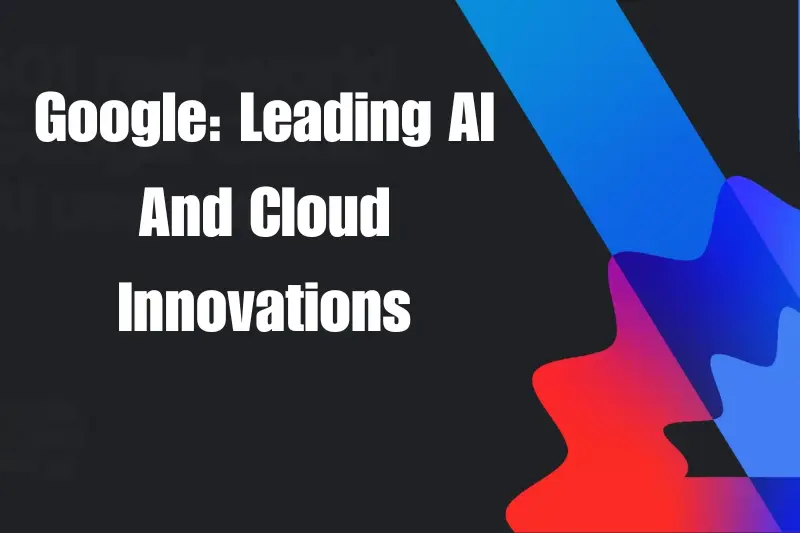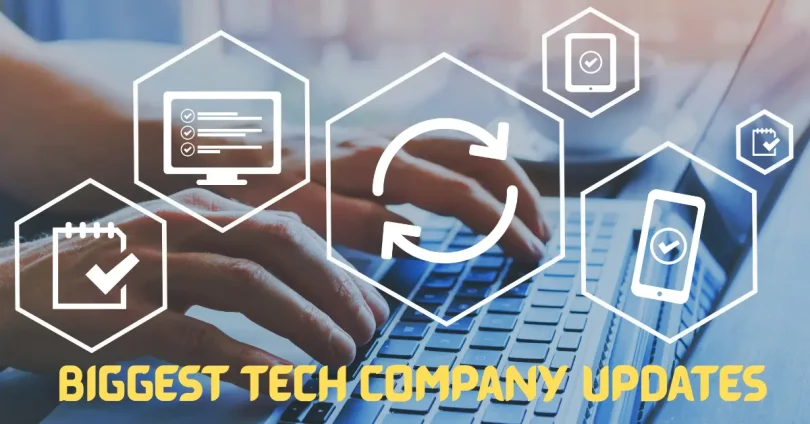The biggest tech company updates of 2025 are transforming the global technology landscape. The major tech companies, including Google, Apple, Nvidia, and Microsoft, are pushing the boundaries of artificial intelligence (AI), cloud computing, gaming, and hardware innovations. However, these companies are also facing mounting regulatory challenges, economic fluctuations, and competition from new market players.
This detailed article explores the most significant updates from these tech giants, shedding light on their future directions and the challenges they are navigating in a rapidly evolving tech ecosystem.
1. Google: Leading AI and Cloud Innovations
 Google remains one of the most influential players in the tech industry, continuously advancing its AI capabilities and enhancing its cloud services. In 2025, the company made waves with several key announcements, particularly in the realm of artificial intelligence.
Google remains one of the most influential players in the tech industry, continuously advancing its AI capabilities and enhancing its cloud services. In 2025, the company made waves with several key announcements, particularly in the realm of artificial intelligence.
AI Innovations
Google has expanded its BigQuery AI service, a cloud-based tool that helps businesses analyze vast amounts of data. A notable collaboration involved toy manufacturer Mattel, which utilized BigQuery AI to gather insights into customer feedback for its Barbie Dreamhouse product. This partnership underscores the growing importance of AI in business decision-making and product development.
To complement its software services, Google introduced the TPUv7 AI chip, boasting 42.5 exaflops of computational power. The TPU (Tensor Processing Unit) chip is specifically designed for high-performance AI computations, positioning Google as a key player in the AI hardware sector. This chip is expected to drive innovation in sectors such as cloud computing, machine learning, and data science.
Furthermore, Google introduced Agent2Agent (A2A), an AI protocol that facilitates collaboration between AI systems across different organizations. This new approach aims to break down barriers between different AI technologies, enabling better communication and shared problem-solving across industries like healthcare, finance, and logistics.
Acquisition of Wiz
In a strategic move to strengthen its cybersecurity portfolio, Google announced the acquisition of Wiz, a cybersecurity firm specializing in cloud security. The $32 billion deal signals Google’s commitment to securing its cloud infrastructure and ensuring the safety of its growing customer base in the AI and cloud space. Wiz, which generated $1 billion in revenue for 2025, is seen as a key player in bolstering Google Cloud’s security offerings.
You may also like to read this:
Latest Tech News USA: April 2025 Key Highlights
Top AI-Powered Apps Of 2024 To Enhance Your Daily Life
2025: How AI Is Revolutionizing Businesses In The USA?
Latest Updates On Apple, Google, And Microsoft In 2025
Breaking Technology News Today: Cybersecurity And AI News
How New AI Advancements 2024 Are Changing Industries
2. Apple: Stock Surge Amid Trade Tensions and Regulatory Scrutiny
Apple’s performance in 2025 has been marked by both financial success and regulatory scrutiny. After a rough start to the year, with a significant stock decline, Apple saw a 12% increase in its stock value, fueled by a temporary pause on tariffs announced by President Trump. This provided a brief respite for U.S. tech companies facing trade war pressures, particularly those like Apple, which heavily depend on international manufacturing and markets.
However, Apple’s regulatory challenges are intensifying, particularly in Europe, where the European Union has ramped up its enforcement of the Digital Markets Act (DMA). This legislation is designed to ensure fair competition in digital markets and curb the monopolistic practices of large tech firms. Apple, along with other tech giants, faces the threat of hefty fines for alleged anti-competitive practices, particularly in its App Store and iOS ecosystem. The DMA has the potential to reshape the way Apple operates in the European market, especially its control over app distribution and in-app purchases.
Despite these challenges, Apple continues to innovate in both hardware and services. The company remains a dominant player in the smartphone market with its flagship iPhone 15 series, while its MacBook and iPad lines continue to see growth. Apple’s services segment, which includes Apple TV+, iCloud, and Apple Music, has also been a major revenue driver, further diversifying the company’s business.
3. Nvidia: Market Dominance in AI Amidst Market Volatility
 Nvidia, the leader in graphics processing units (GPUs), continues to be a driving force in the AI and gaming sectors. In 2024, Nvidia became the world’s most valuable company with a market capitalization surpassing $3.3 trillion, driven largely by the increasing demand for GPUs in AI research, data centers, and gaming.
Nvidia, the leader in graphics processing units (GPUs), continues to be a driving force in the AI and gaming sectors. In 2024, Nvidia became the world’s most valuable company with a market capitalization surpassing $3.3 trillion, driven largely by the increasing demand for GPUs in AI research, data centers, and gaming.
However, Nvidia’s dominance faced a significant setback in early 2025 when the company saw a $600 billion drop in its market capitalization in a single day. This sharp decline was due in part to the growing competition from DeepSeek, a Chinese AI startup that developed an alternative AI model at a significantly lower cost. DeepSeek’s AI models, which outperformed Nvidia’s in certain applications, have gained significant traction in the market, adding pressure on Nvidia’s position.
Despite the market fluctuation, Nvidia remains focused on innovation. The company continues to refine its RTX GPUs and DGX AI systems, which are essential for powering data centers, AI applications, and research labs. Nvidia’s dominance in AI hardware is expected to remain strong as demand for AI models and computational power continues to grow.
4. Microsoft: Expanding AI Capabilities and Gaming Leadership
Microsoft is making significant strides in both AI and gaming, with major updates across its software and hardware platforms.
AI Integration with CoPilot
Microsoft’s CoPilot AI is one of the company’s flagship innovations, now integrated into several products. This AI assistant has been upgraded to include memory capabilities, allowing it to retain user preferences and tailor recommendations. Additionally, CoPilot AI now supports enhanced camera integrations, further enhancing its utility in mobile devices and enterprise software.
Gaming and Acquisition of Activision Blizzard
Microsoft’s gaming division has seen a tremendous boost with the upcoming launch of the Nintendo Switch 2, set for release on June 5, 2025. The new console will feature 4K resolution and 120fps gameplay, marking a major leap in gaming hardware technology. This release is expected to strengthen Microsoft’s position in the global gaming market, competing head-to-head with rivals like Sony and Nintendo.
In addition to hardware innovations, Microsoft completed the $68.7 billion acquisition of Activision Blizzard in November 2023, bringing iconic gaming franchises such as Call of Duty, Warcraft, and Diablo into its fold. This acquisition solidifies Microsoft’s leadership in the gaming industry and sets the stage for further expansion into the metaverse and immersive gaming experiences.
5. European Union’s Regulatory Actions and Their Impact on Big Tech
The European Union continues to be a significant force in shaping the global tech landscape through its regulatory actions. Under the Digital Markets Act (DMA), the EU is aggressively pursuing cases against major U.S. tech companies, including Google, Apple, and Meta, for alleged anti-competitive behavior.
Meta, for instance, is facing potential fines exceeding $1 billion due to its advertising practices on platforms like Facebook and Instagram, which are seen as anti-competitive under EU laws. The EU is also targeting other aspects of big tech operations, including data privacy, user tracking, and the control of app marketplaces.
These regulatory challenges are forcing companies to adapt their business models, particularly in Europe, where compliance with the DMA could lead to costly changes in how services are delivered to consumers. As a result, the biggest tech company updates are increasingly being influenced by the shifting regulatory landscape, which aims to create a fairer digital marketplace.
Conclusion: Navigating the Future of Tech Giants
The biggest tech company updates of 2025 showcase how innovation, market fluctuations, and regulatory scrutiny are shaping the future of the tech industry. Companies like Google, Apple, Nvidia, and Microsoft are at the forefront of technological advancements, especially in AI, cloud computing, gaming, and hardware. However, they must also navigate increasing regulatory challenges, particularly from the European Union, which is pushing for stricter rules to ensure fair competition in the digital market.
As these companies continue to lead the charge in technological innovation, they must also adapt to the changing legal and market dynamics. The next few years will be crucial in determining how these biggest tech companies balance growth, regulation, and competition to maintain their positions as industry leaders.
FAQs
1. Which tech companies are making updates in 2025?
In 2025, major updates are coming from Google, Apple, Nvidia, and Microsoft. These updates focus on AI advancements, cloud computing, gaming innovations, and hardware developments.
2. What updates did Google make in 2025?
Google introduced:
BigQuery AI for business data analysis.
TPUv7 AI chip with 42.5 exaflops for advanced AI tasks.
Agent2Agent (A2A), enabling AI systems to collaborate across organizations.
Acquired Wiz for enhanced cloud security.
3. How is Apple responding to regulatory issues in 2025?
Apple faces scrutiny under the Digital Markets Act (DMA) in Europe, potentially leading to fines for anti-competitive practices. Despite this, Apple’s stock surged by 12%, and its core products, including the iPhone and services, remain strong.
4. Why did Nvidia face a market downturn in 2025?
Nvidia’s market value dropped by $600 billion due to competition from DeepSeek, a Chinese AI startup offering lower-cost AI models. Despite this, Nvidia remains a leader in AI hardware.
5. What did Microsoft announce in 2025?
Microsoft made significant moves, including:
The upgrade of CoPilot AI for smarter enterprise software.
The launch of the Nintendo Switch 2, with 4K and 120fps gameplay.
Completing its $68.7 billion acquisition of Activision Blizzard







